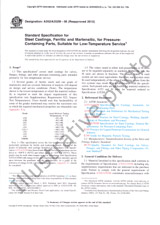We need your consent to use the individual data so that you can see information about your interests, among other things. Click "OK" to give your consent.
ASTM G138-12(2020)e1
Standard Test Method for Calibration of a Spectroradiometer Using a Standard Source of Irradiance (Includes all amendments and changes 7/20/2020).
Translate name
STANDARD published on 1.6.2020
The information about the standard:
Designation standards: ASTM G138-12(2020)e1
Publication date standards: 1.6.2020
SKU: NS-1000090
The number of pages: 9
Approximate weight : 27 g (0.06 lbs)
Country: American technical standard
Category: Technical standards ASTM
The category - similar standards:
Annotation of standard text ASTM G138-12(2020)e1 :
Keywords:
calibration, irradiance, spectral, spectroradiometer,, ICS Number Code 19.100 (Non-destructive testing)
Additional information
| Significance and Use | ||||||||
|
4.1 This method is intended for use by laboratories performing calibration of a spectroradiometer for spectral irradiance measurements using a spectral irradiance standard with known spectral irradiance values and associated uncertainties traceable to a national metrological laboratory that has participated in intercomparisons of standards of spectral irradiance, known uncertainties and known measurement geometry. 4.2 This method is generalized to allow for the use of different types of input optics provided that those input optics are suitable for the wavelength range and measurement geometry of the calibration. 4.3 This method is generalized to allow for the use of different types of monochromators provided that they can be configured for a bandwidth, wavelength range, and throughput levels suitable for the calibration being performed. 4.4 This method is generalized to allow for the use of different types of optical radiation detectors provided that the spectral response of the detector over the wavelength range of the calibration is appropriate to the signal levels produced by the monochromator. |
||||||||
| 1. Scope | ||||||||
|
1.1 This test method covers the calibration of spectroradiometers for the measurement of spectral irradiance using a standard of spectral irradiance that is traceable to a national metrological laboratory that has participated in intercomparisons of standards of spectral irradiance. 1.2 This method is not limited by the input optics of the spectroradiometric system. However, choice of input optics affects the overall uncertainty of the calibration. 1.3 This method is not limited by the type of monochromator or optical detector used in the spectroradiometer system. Parts of the method may not apply to determine which parts apply to the specific spectroradiometer being used. It is important that the choice of monochromator and detector be appropriate for the wavelength range of interest for the calibration. Though the method generally applies to photodiode array detector based systems, the user should note that these types of spectroradiometers often suffer from stray light problems and have limited dynamic range. Diode array spectroradiometers are not recommended for use in the ultraviolet range unless these specific problems are addressed. 1.4 The calibration described in this method employs the use of a standard of spectral irradiance. The standard of spectral irradiance must have known spectral irradiance values at given wavelengths for a specific input current and clearly defined measurement geometry. Uncertainties must also be known for the spectral irradiance values. The values assigned to this standard must be traceable to a national metrological laboratory that has participated in intercomparisons of standards of spectral irradiance. These standards may be obtained from a number of national standards laboratories and commercial laboratories. The spectral irradiance standards consist mainly of tungsten halogen lamps with coiled filaments enclosed in a quartz envelope, though other types of lamps are used. Standards can be obtained with calibration values covering all or part of the wavelength range from 200 to 4500 nm. 1.5 This standard does not purport to address all of the safety concerns, if any, associated with its use. It is the responsibility of the user of this standard to establish appropriate safety, health, and environmental practices and determine the applicability of regulatory limitations prior to use.1.6 This international standard was developed in accordance with internationally recognized principles on standardization established in the Decision on Principles for the Development of International Standards, Guides and Recommendations issued by the World Trade Organization Technical Barriers to Trade (TBT) Committee. |
||||||||
| 2. Referenced Documents | ||||||||
|
We recommend:
Technical standards updating
Do you want to make sure you use only the valid technical standards?
We can offer you a solution which will provide you a monthly overview concerning the updating of standards which you use.
Would you like to know more? Look at this page.




 Cookies
Cookies
